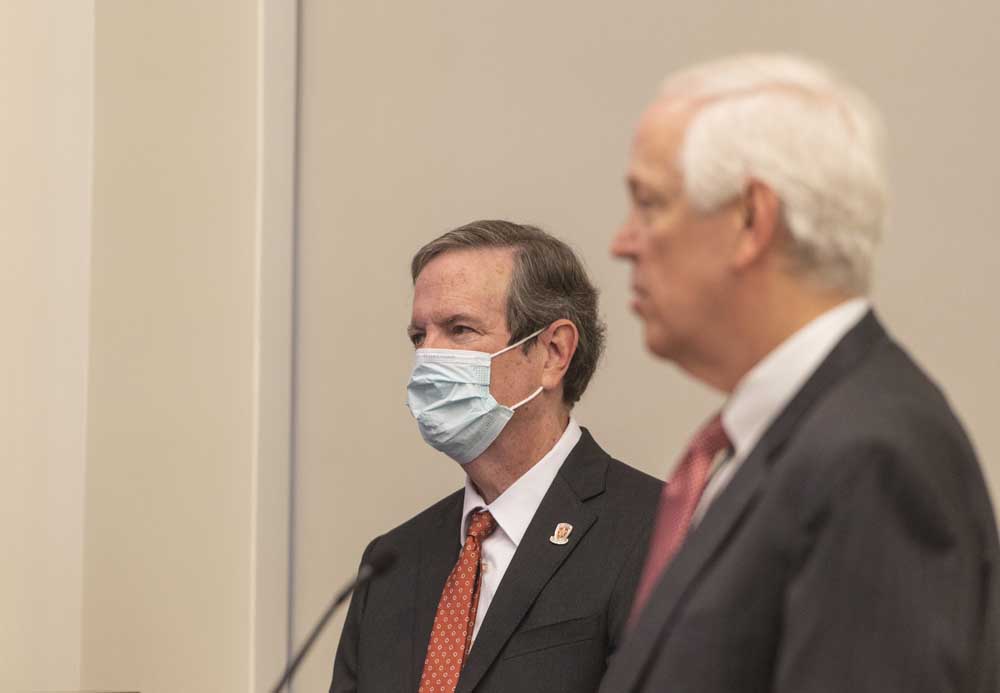NET Health: COVID soaring among 11-to-20-year-olds
Published 3:42 pm Wednesday, September 22, 2021

- Dr. Paul McGaha speaks in November 2020 accompanied by NET Health CEO George Roberts.
Northeast Texas Public Health District CEO George Roberts and Smith County Public Health Authority Paul McGaha updated city officials and residents Wednesday on COVID-19 at Wednesday’s Tyler City Council meeting.
Roberts read Monday’s COVID-19 updates reported by NET Health to open his presentation. Monday, the most recent of NET Health’s bi-weekly reports, showed 481 new cases of COVID-19 in Smith County: 289 new confirmed cases along with 192 probable cases. Total active cases within the county are now at 6,613.
Trending
“We’ve experienced our highest levels since we first announced the first COVID-19 cases in this room on March 13, 2020,” Roberts said, adding case numbers on a daily basis are higher and hospitalizations compared to the winter numbers.
Roberts emphasized NET Health’s resolution announced earlier this month that recommends all citizens to obtain a COVID-19 vaccine as soon as possible and strongly recommended local school districts utilize face masks for all individuals on campus and at school-related events, so long the area had a moderate to a substantial community spread level.
Roberts reported 11- to 20-year-olds are among the highest number of COVID-19 related cases, and among deaths, those who are older are still dying at higher rates. Additionally, younger people are dying at higher rates as a result of the virus.
The NET Health presentation also reflected COVID-19 deaths by race and ethnicity in Smith County. Where values are known, NET Health reported 62.6% of deaths are white, 19.1% Black, .3% Asian, .3% Black or African, 8.9% Hispanic, .6% Pacific Islander, and 8.3% are an unknown race and ethnicity.
McGaha shared a seven-day rolling average of 23-hour lab-confirmed COVID-19 hospitalizations by age across the state.
The report showed hospitalization rates in those 50 to 69 years of age are still high as earlier in the year, but a higher rate of those hospitalized are ages 30 to 49. Those over 75 are still being hospitalized at a higher rate, mostly equivalent to the age group 50 to 69. Pediatric cases are on the rise and hospitalization rates in those 18 to 29 years of age are the highest.
Trending
“The moral of that story is we’re seeing more hospitalizations in younger people,” McGaha said, adding health care workers are seeing more cases in pediatric and younger populations.
Roberts emphasized vaccination rates in Texas in comparison with Smith County.
In Texas, the Department of State Health Services reports 70.96% of the Texas population that are 12 years of age and older are vaccinated with at least one dose, while 60.50% of that group are fully vaccinated.
Approximately 86.97% of the Texas population who are 65 years of age or older are vaccinated with at least one dose, while 78.50% of that group is fully vaccinated.
In Smith County, the DSHS reports 54.03% of the population that are 12 years of age and older are vaccinated with at least one dose, while 46.14% of that group are fully vaccinated.
Approximately 81.80% of the Smith County population who are 65 years of age or older are vaccinated with at least one dose, while 75.19% of that group is fully vaccinated.
The council later heard an update on self-reported COVID-19 cases in public schools across Texas from Sept. 6 to 12, obtained through the DSHS.
On the week of Sept. 12, the most recent reported week, 23,779 students reported a positive case on school campuses during the week and 3,851 cases were reported among staff.
McGaha informed the council Pfizer recently announced their vaccine to be safe and highly effective in young children aged 5 to 11 years of age.
“Children are constituting a larger percentage of cases. Now about one in five cases, one in four cases by some data, so that would be a good thing to be able to immunize those young children,” he said
McGaha said if the data is approved by the Food and Drug Administration and Centers for Disease Control, COVID-19 vaccines will be available for children as soon as the end of September.
McGaha shared a CDC report that said fully vaccinated people had a reduced risk of infection, a 10-time reduction in hospitalization, and fully vaccinated people are 10 times less likely to die from the virus after Delta became the most common variant. McGaha said the vast majority of those hospitalized in Tyler for a COVID-19 infection have not been fully vaccinated.
McGaha also explained the path to a booster dose recommendation and how those doses are approved for recommendation by the CDC, then ultimately authorized by the FDA.
McGaha said other at-risk groups that may receive an endorsement to receive the booster dose may soon include health care workers, emergency responders and teachers. If approval goes smoothly, NET Health, local pharmacies and others will have the green light to give the booster doses of Pfizer. McGaha said booster doses may be available to the select groups as soon as the end of the month or early October.
McGaha said among the 17 to 18 COVID-19 antibody infusion centers that provide treatment with monoclonal antibodies, the UT Health Science Center at Tyler has administered 1,213 doses of the treatment as of Monday. The treatment, McGaha said, is shown to be successful in lowering hospitalization rates and deaths, as well as success in treating patients.
Though treatment had been mostly available, McGaha brought the council’s attention to an announcement from the U.S. Department of Health and Human Services that notified states of supply constraints. As a result of the limited supply and increased demand, providers may no longer order monoclonal antibody treatment products directly from a private vendor.
Instead, the HHS will be providing weekly allocations to the states. The states, in turn, will make allocations to providers. An allocation strategy is being developed to best manage distribution, he said.
McGaha clarified the treatment only grants immunity to the virus for about 90 days, whereas the vaccine provides longer immunity overall.
The Tyler City Council also heard an update in the Delta variant and other variants. McGaha said the Mu variant is being closely watched by the World Health Organization, which said the variant has the potential to evade immunity provided by vaccines and antibodies.







